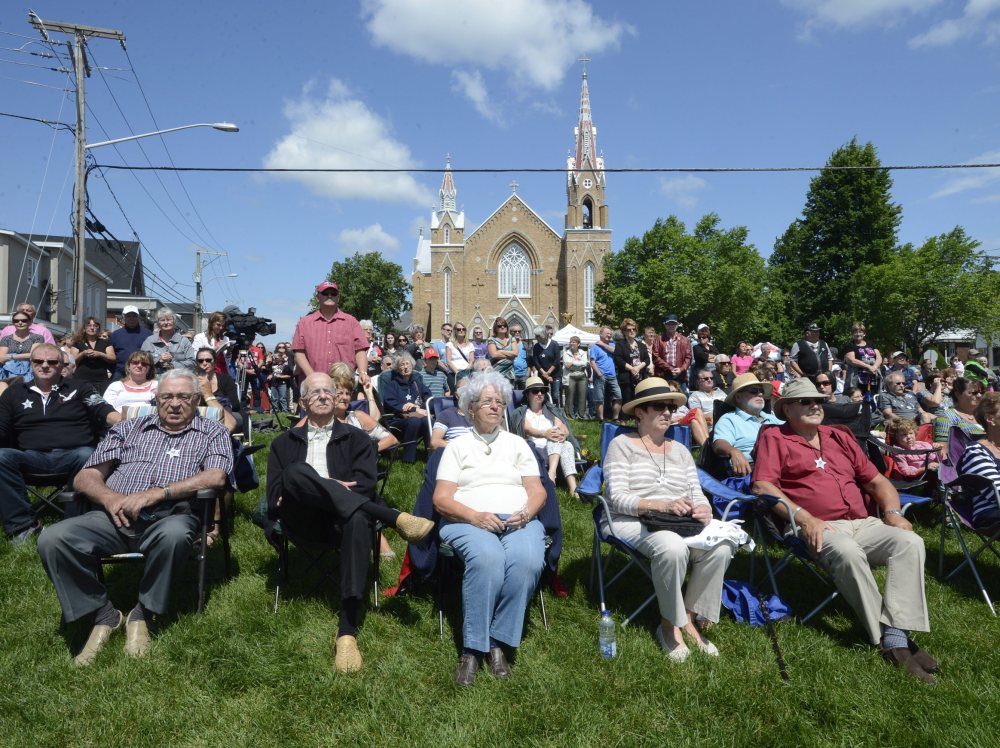LAC-MEGANTIC, Quebec — Crowds packed a church in the eastern Quebec town of Lac-Megantic Sunday to remember the 47 people who were killed there a year ago when a runaway oil train derailed and exploded, sending cataclysmic fireballs that obliterated a large swath of the downtown district.
Earlier, about 1,000 people marched in a solemn procession and observed a minute of silence at 1:15 a.m., the exact moment when the fuel-laden train went off the tracks in the center of town.
It was early July 6, 2013, when the train transporting oil was left unattended by its lone crew member while parked outside Lac-Megantic. The train rolled downhill toward the town of 6,000, where more than 60 cars derailed and many exploded. Forty-seven people died, and dozens of buildings were destroyed. Local firefighters joined by about 30 firefighters who crossed the border from Maine prevented an even worse disaster by dousing the unexploded tankers with water drawn from a nearby lake.
At Ste-Agnes Church, near the crash site, the first responders who battled the inferno received a resounding round of applause as they entered in long lines for a memorial Mass on Sunday morning. Framed photographs of the victims and bouquets of flowers were on display at the front of the church.
“How many times has the whole community of Lac-Megantic impressed us, by its wisdom, and its capacity to lift itself up?” Archbishop Luc Cyr told worshippers.
“You have given us a beautiful message of dignity and strength. Yes, there have been tears and great suffering but at the same time there has been overwhelming generosity and love,” Cyr said.
Canadian Prime Minister Stephen Harper marked the first anniversary of the tragedy in a statement, noting the “resilience, determination and extraordinary strength of character” of Lac-Megantic residents.
“No passage of time can erase from our consciousness the lives lost, the injured and the families torn apart by this tragedy,” Harper said.
Dignitaries including Gov.-Gen. David Johnston and Quebec Premier Philippe Couillard also attended the service late Sunday morning.
Though a year has passed, the emotional scars in the community remain as deep as the physical damage that is still so apparent on the local landscape.
The railroad responsible for the tragedy, the Maine-based Montreal, Maine and Atlantic Railway, has been sold and is under new ownership. The new company, Central Maine and Quebec Railroad, wants to resume oil shipments in the future. But it’s in no hurry to press the issue. The accident prompted Canada and the U.S. to tighten regulations and phase out old tanker models.
In Lac-Megantic, the focus is on creating a settlement fund to compensate survivors. The environmental cleanup alone could end up costing $200 million to $500 million, based on early estimates.
In May, three railway employees were charged with 47 counts each of criminal negligence, including engineer Thomas Harding, who is accused of failing to set enough brakes on the train. The men are set to appear in court in September. Montreal, Maine and Atlantic Railway was also charged.
The Sunday morning service highlighted a weekend of events to remember the anniversary of the tragedy. It was followed by the unveiling of a monument in the form of a book inscribed with the names of the victims on the lawn of Ste-Agnes Church.
The early morning procession followed a midnight Mass and a moving speech by Mayor Colette Roy Laroche, who received two standing ovations from about 1,200 people filling Ste-Agnes Church. An overflow crowd of about 200 people watched the service on a big screen set up near the site of the derailment,
“For several minutes we tried to convince ourselves that it wasn’t true,” Roy Laroche said of the July 6 catastrophe. “But what happened to us was a nightmare. When we removed our hands (from our eyes), the horror was still there and the worst was to come.”
“A year ago, we found ourselves in one of the worst tragedies in the histories of Quebec and Canada,” she said. “We were also covered by the biggest wave of love and solidarity that modern Quebec has ever known.”
Many participants in the early morning march wiped away tears as they held hands with the person next to them.
Most stared sadly at the downtown area where dozens of buildings were gutted. To this day the zone remains off-limits behind metal fences as decontamination work continues.
A half-dozen people left the march to sit side-by-side on the railway track, looking at their broken town.
“I think it was important to do this to complete our mourning process,” said walker Bernard Boulet, whose sister Marie-France was declared dead in the disaster, though her remains were never found.
Send questions/comments to the editors.


